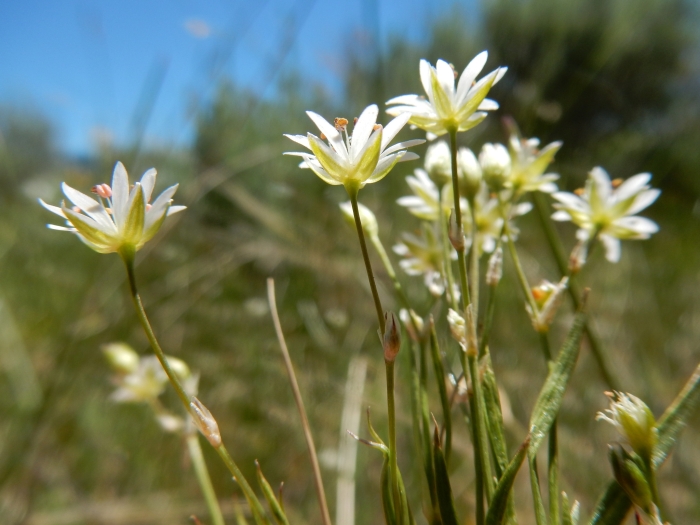Longstalk Starwort
(Stellaria longipes)
Longstalk Starwort (Stellaria longipes)
/
/

© Matt Lavin
CC BY 4.0
Image By:
© Matt Lavin
Recorded By:
Copyright:
CC BY 4.0
Copyright Notice:
Photo by: © Matt Lavin | License Type: CC BY 4.0 | License URL: http://creativecommons.org/licenses/by/4.0/ | Uploader: mattlavin | Publisher: iNaturalist |

























Estimated Native Range
Summary
Stellaria longipes, commonly known as Longstalk Starwort or Goldie’s Starwort, is a perennial herb that is part of the circumpolar flora, occurring across the northern latitudes of the Northern Hemisphere. It is native to a variety of habitats including moist meadows, stream banks, and open areas in boreal forests, as well as tundra, taiga, subalpine, and alpine regions. Typically, this species forms dense mats or clumps with stems that range from short and simple to long and branched, reaching up to 10-40 cm in height. The small, star-shaped white flowers feature five deeply lobed petals and bloom from late spring to early summer. The flowers are modest in size but can be quite numerous, creating a delicate display.
Longstalk Starwort is valued for its hardiness and adaptability to cold climates, making it a suitable choice for rock gardens and alpine collections in northern gardens. It requires moist but well-drained soils and can tolerate a range of soil types, from sandy to loamy. While it prefers full sun to partial shade, it can also grow in more shaded conditions. In cultivation, it is relatively low maintenance but may require protection from slugs and snails. It is not commonly associated with serious diseases or pests. Due to its gynodioecious nature, it can be an interesting subject for botanical study and to encourage biodiversity in the garden.CC BY-SA 4.0
Longstalk Starwort is valued for its hardiness and adaptability to cold climates, making it a suitable choice for rock gardens and alpine collections in northern gardens. It requires moist but well-drained soils and can tolerate a range of soil types, from sandy to loamy. While it prefers full sun to partial shade, it can also grow in more shaded conditions. In cultivation, it is relatively low maintenance but may require protection from slugs and snails. It is not commonly associated with serious diseases or pests. Due to its gynodioecious nature, it can be an interesting subject for botanical study and to encourage biodiversity in the garden.CC BY-SA 4.0
Plant Description
- Plant Type: Herb
- Height: 0.1-1 feet
- Width: 0.5-1 feet
- Growth Rate: Moderate
- Flower Color: White
- Flowering Season: Spring
- Leaf Retention: Deciduous
Growth Requirements
- Sun: Full Sun, Part Shade
- Water: High
- Drainage: Fast, Medium, Slow
Common Uses
Border Plant, Edible*Disclaimer: Easyscape's listed plant edibility is for informational use. Always verify the safety and proper identification of any plant before consumption., Low Maintenance
Natural Habitat
Native to moist meadows, stream banks, and open areas in boreal forests, as well as tundra, taiga, subalpine, and alpine regions
Other Names
Common Names: Giant Chickweed, Goldie’s Starwort, Long-Stalked Chickweed, Long-Stalked Stitchwort
Scientific Names: , Stellaria longipes, Alsine edwardsae, Stellaria ciliatisepala, Stellaria edwardsae, Stellaria graminea, Stellaria longipes var. edwardsae, Stellularia longipes,
GBIF Accepted Name: